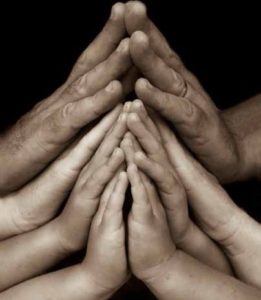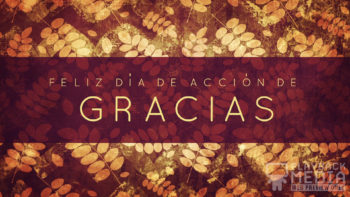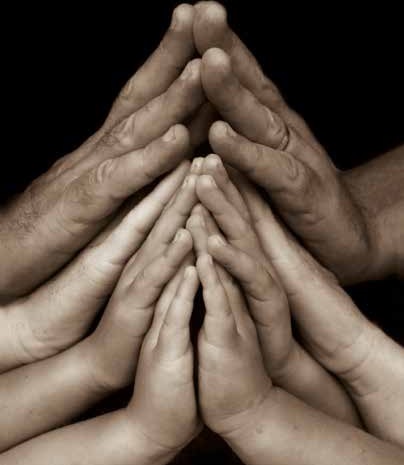Redeem Your Thanksgiving (Day of the Action of Thanks)
On October 31st my regular Thursday slot for Speculative Faith happened to fall on Halloween and now the same slot falls on the Thanksgiving holiday in the United States, about a month later. It might come as a surprise to some people, but I’m going to offer the same bottom-line advice about both holidays. Just as I recommended “Reedem Your Halloween,” likewise let me suggest you redeem your Thanksgiving! (What I mean by referencing the phrase “Day of the Action of Thanks” I will explain lower down.)
The article on Halloween looked at an Answers in Genesis article that suggested that the Halloween holiday reflects a memorial that ultimately may have its origins in the Flood of Noah. I found flaws with that reasoning (holidays related to the harvest are not as universal as Answers in Genesis suggested), but agreed when the article said that even though there are clear Pagan roots in elements of Halloween, we can claim it and celebrate it if we choose to do so. Though not celebrating is also fine, I said. But if we celebrate it, we ought to celebrate it in a way that intentionally honors God, I said.
“How can he say the same thing about Thanksgiving?” someone might ask. “Thanksgiving is as opposite as possible from Halloween!” someone might declare. Not even close to everyone would say that, of course. But the person who would say it probably would be thinking about the fact the origins of Halloween are ancient and traditional and a bit obscure but clearly have Pagan elements. Whereas the origin of the Thanksgiving is not at all ancient and is considerably less obscure and is definitely Christian.
Abraham Lincoln’s 1863 proclamation of a US Federal holiday dedicated to Thanksgiving did not begin the holiday for the first time, but unified a number of different celebrations of thanks held differently in various US states back then. But still, all of the pre-1863 versions of Thanksgiving in the United States (many of them declared as special holidays based on specific events that didn’t repeat every year) were thoroughly Christian. A day of Thanksgiving was set aside to pray to thank God for something or other within the bounds of not only Christian tradition, but more specifically, English-speaking Protestantism. Though our most famous example, the feast of the Pilgrims in 1621 at the time of the harvest in Plymouth Colony was of course both a day of eating and of prayers of gratitude.
For the 1863 holiday, the feasting as part of the giving of thanks wasn’t as important as the thanking. (Lincoln felt that during the horrors of the US Civil War, officially remembering to be thankful on a specific day, the last Thursday in November, would provide a boost for United States morale at a grim point in history.)
Though pretty much right away the feasting rivaled the thanking in importance. Traditional Thanksgiving dishes were derived from foods people in the late 1800s thought early settlers to the United States enjoyed. (Though the menus weren’t always historically accurate–for example, did you know the Pilgrims’ famous meal in Plymouth Bay in 1621 included venison and shellfish?) Though of course as important as feasting was, it didn’t displace the thanking God part.
Since it became common for most people to have Thanksgiving Day off work for almost all jobs (this became standard in the late 1800s and early 1900s), Thanksgiving Day became the day above almost all other days to set up a reunion with family and enjoy their company in a group. Christmas probably has always been number 1 in that regard, but in the USA, Thanksgiving came to mean “family” perhaps even more than Christmas. For a while, at least. Though of course, it was generally expected that getting the whole family together and having a feast with them would also include thanking God as a group.
Because Thanksgiving falls within the season in which American football is played, it was a pretty early development that someone decided that since people are off work on Thanksgiving Day, they might enjoy a football game. The first football game held on Thanksgiving was the 1934 match between the Detroit Lions and Chicago Bears, broadcast nationally on radio (the Lions lost). Eventually of course other football games, more than just one per day, would be scheduled for Thanksgiving, so that, for many families in the United States, football-watching dominates what people actually do on the holiday. Though you can gather family together, have a feast, watch football, and also thank God, right?
Though Thanksgiving also falls in the period prior to Christmas, which has for a very long time been the premier holiday in which to buy presents in Western culture (and now, all around the world). Retailers came up with the idea of boosting their sales post-Thanksgiving by advertising themselves on Thanksgiving by sponsoring a parade. This actually happened in Canada first, in 1905, but was copied in the USA starting in 1924 by Macy’s. And the tradition of having a parade on Thanksgiving Day continues, with the idea that the parade would boost sales for the Christmas season after Thanksgiving was over. Though of course you can get family together, have a feast, watch football and/or a parade, and also thank God.
It wasn’t until the 1950s it became extremely common for people to take the day after Thanksgiving off work as a major day for shopping and not until 1966 that the term “Black Friday” was coined for the frenzy that post-Thanksgiving discounts inspire. Because of the fact that it used to be the case that retailers had an agreement among themselves that major promoting of Christmas sales wouldn’t start until Thanksgiving was over, giving that holiday some space, “Black Friday” reigned supreme for a number of decades as the official opening of the Christmas shopping season (and of course is still very important).
Though the traditional respect retailers used to have for Thanksgiving Day doesn’t hold true anymore. Post-2000, we see certain sales deals arising prior to Black Friday. A “Pre-Black Friday” sale, plenty common nowadays, actually means a sale on Thanksgiving Day (or even earlier than Thanksgiving, but to include Thanksgiving Day). So that adds shopping to the things people do on Thanksgiving. But a person can still get together with family, have a feast, watch football, watch a parade, go shopping, and still offer thanks to God, right?
And here’s the point we admit the truth. Yes, people can as in it’s possible, but is that what people actually do? Even the common current use of “Turkey Day” to jokingly refer to the holiday downplays the thanking part. While I would say most people really do think you ought to reflect on your blessings on Thanksgiving Day, isn’t it true that most people do so very briefly? And of course, no surprise, a culture that isn’t mindful of God in general isn’t into thanking God specifically. Even those who feel thankful are often not thankful to God.
I don’t want to overstate the case here and claim that in 1863, one hundred percent of everyone only prayed and thanked God on Thanksgiving Day, whereas now the percentage of Americans who do so has fallen into the single digits. That wouldn’t quite be true–there were secularists even in 1863, for example–so the sentence before this one would be an exaggeration of what actually is true. Though it in fact is true that the celebration of Thanksgiving Day has changed–there really is less thanking now and a lot more of everything else than there used to be.
For some people, what Thanksgiving has become is so commercial and revolting that they may not want to celebrate it at all. Hey, if they don’t want to, that’s their business. Though I imagine that attitude is rare–probably the main people who don’t celebrate Thanksgiving are those from other countries in which it isn’t its own holiday (such as the United Kingdom). But for me, I want celebrate the holiday while deliberately remembering the specific Christian meaning behind the very idea of Thanksgiving–that is, thanking God for blessings.

In an interesting irony, I chose this image from a nation that doesn’t recognize an official national day of thanksgiving. Image credit: Jesuit.org.uk
Which brings me around to something I mentioned both in my first paragraph and the title of this piece. If you don’t speak Spanish you may not have known this, but in Spanish, there is no single word that means “thanksgiving.” So the name of the US holiday “Thanksgiving Day” is usually rendered in Spanish as “Día de Acción de Gracias.” Which, if you translated that literally back into English would mean: “day of the action of thanks.” Yes, exactly.

Image credit: playbackmedia.com
There should be an action with our thanking, something we actually do, as we literally offer prayers in the act of expressing thanksgiving to the God who gave us the things we are thankful for. That’s how we redeem our Thanksgiving, my friends, that’s how we do it the way it was intended to be done. We can have the feasting and family time and football and parading and shopping, too. But we cannot forget the literal thanking–yes, thanking people is good and should be part of the holiday as well. But first and foremost, we redeem our Thanksgiving by thanking God in prayer. Openly and without shame.
Don’t forget to do that–even though surrounded by a culture jokingly calling the holiday “Turkey Day,” even though surrounded by a culture that rarely prays. Please remember to keep the overt act of thanking God in prayer as a central part of your Thanksgiving holiday.











































